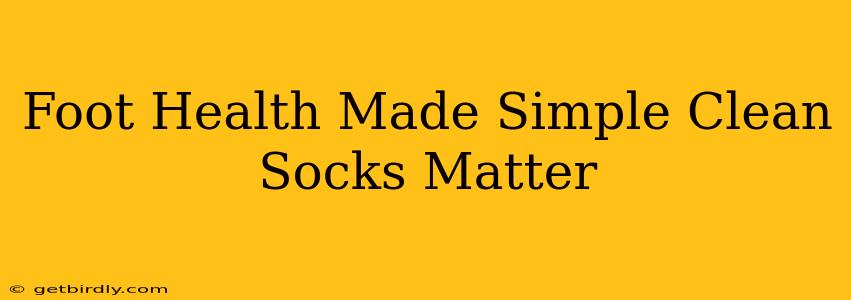Foot Health Made Simple: Clean Socks Matter
Maintaining healthy feet often gets overlooked in our daily routines, but it's a crucial aspect of overall well-being. While regular foot washing is essential, a frequently overlooked element of foot hygiene is the importance of clean socks. Surprisingly, choosing and wearing clean socks plays a significant role in preventing various foot problems. This article will delve into why clean socks matter, offering practical advice and answering common questions about maintaining healthy feet.
Why are Clean Socks Crucial for Foot Health?
Clean socks are the first line of defense against a multitude of foot problems. Our feet sweat, and this moisture, combined with dirt, bacteria, and fungi, creates a breeding ground for infections. Wearing dirty socks traps this moisture, leading to various issues:
- Athlete's foot: This common fungal infection thrives in damp, dark environments like the inside of a sweaty shoe. Dirty socks exacerbate this problem, leading to itching, burning, and scaling.
- Bacterial infections: Bacteria proliferate in moist, unclean environments. This can result in unpleasant odors, skin infections, and in severe cases, more serious complications.
- Fungal nail infections (onychomycosis): Fungal infections can spread from the skin to the nails, leading to discoloration, thickening, and crumbling of the nails. Dirty socks increase the risk of this infection.
- Blisters: Friction and moisture from dirty socks can irritate the skin, leading to painful blisters.
- Foot odor: Bacteria breaking down sweat produce unpleasant odors. Clean socks significantly reduce foot odor.
What Kind of Socks Should I Wear?
Choosing the right type of socks is equally important as keeping them clean. Here are some key factors to consider:
- Material: Opt for moisture-wicking materials like merino wool, synthetic blends (polyester, nylon), or athletic socks designed to draw sweat away from the skin. Avoid 100% cotton socks, as they tend to retain moisture.
- Fit: Socks should fit snugly but not too tightly, preventing bunching and friction. Avoid socks that are too loose, as they can increase the risk of blisters.
- Seams: Socks with minimal seams or flat seams can reduce friction and discomfort.
How Often Should I Change My Socks?
This is crucial! You should change your socks at least once a day, and even more frequently if your feet sweat a lot or you're engaging in physical activity. If your feet become excessively sweaty during the day, consider carrying a spare pair of socks to change into.
What Happens If I Don't Wear Clean Socks?
Ignoring the importance of clean socks can lead to a range of unpleasant consequences, as outlined above. Persistent neglect can result in chronic foot infections requiring medical treatment, and in some cases, long-term complications.
How Can I Prevent Foot Problems Beyond Clean Socks?
While clean socks are paramount, several other habits contribute to healthy feet:
- Wash your feet daily: Use soap and water to thoroughly clean your feet, paying attention to the spaces between your toes.
- Dry your feet thoroughly: Make sure to dry your feet completely, especially between the toes, after washing.
- Choose breathable shoes: Wear shoes that allow your feet to breathe and avoid wearing the same shoes every day.
- Keep your toenails trimmed: Trim your toenails straight across to prevent ingrown toenails.
- Moisturize your feet (but not between your toes): Apply moisturizer to your feet to keep them hydrated, but avoid applying it between your toes.
- Check your feet regularly: Inspect your feet daily for any signs of injury, infection, or changes in skin or nail appearance. Consult a podiatrist if you notice any concerning issues.
What About Athletes and People with Sweaty Feet?
How often should athletes change their socks? Athletes should change their socks multiple times a day, especially during and after intense training. Consider carrying extra pairs of moisture-wicking socks.
What can people with excessively sweaty feet do? Individuals with hyperhidrosis (excessive sweating) should prioritize moisture-wicking socks, change them frequently, and consider using antiperspirants specifically designed for the feet. Consulting a doctor might also be beneficial.
By following these simple guidelines, you can significantly improve your foot health and prevent many common foot problems. Remember, clean socks are a simple yet effective step towards healthy and happy feet.

